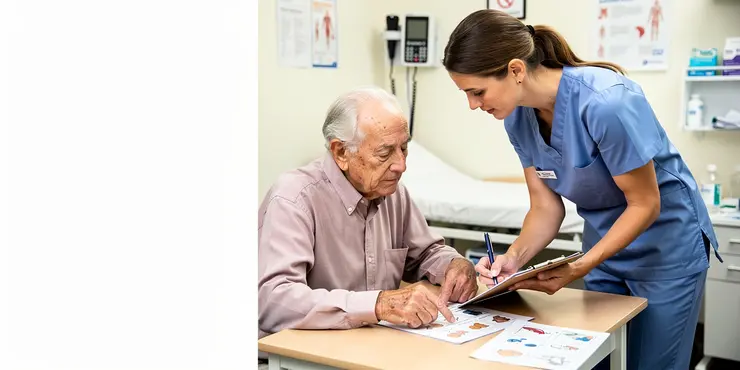
Find Help
More Items From Ergsy search
-
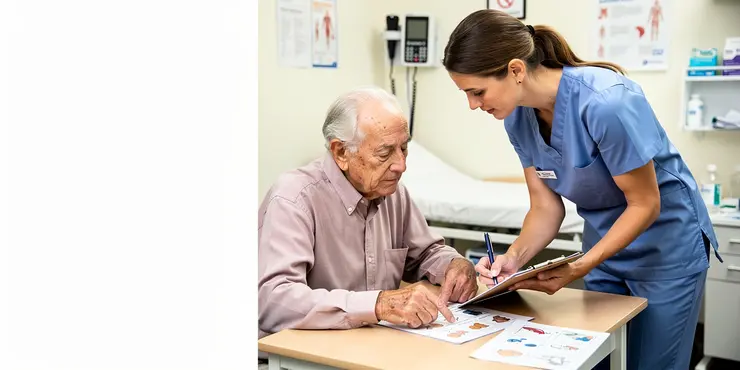
What are the stages of Alzheimer's disease?
Relevance: 100%
-

How can carers plan for future stages of Alzheimer's disease?
Relevance: 82%
-
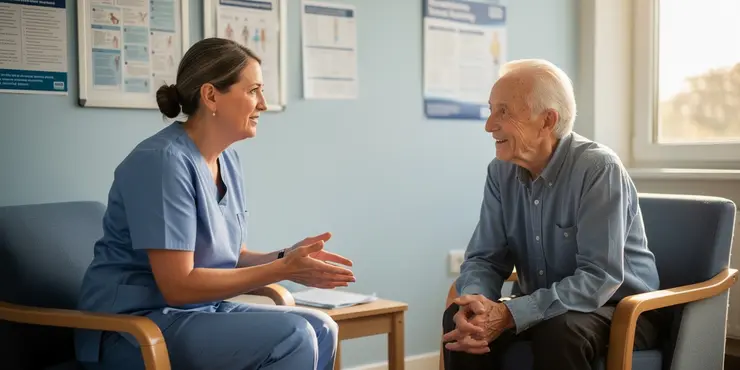
What is Alzheimer's disease?
Relevance: 72%
-

How common is Alzheimer's disease in the UK?
Relevance: 66%
-
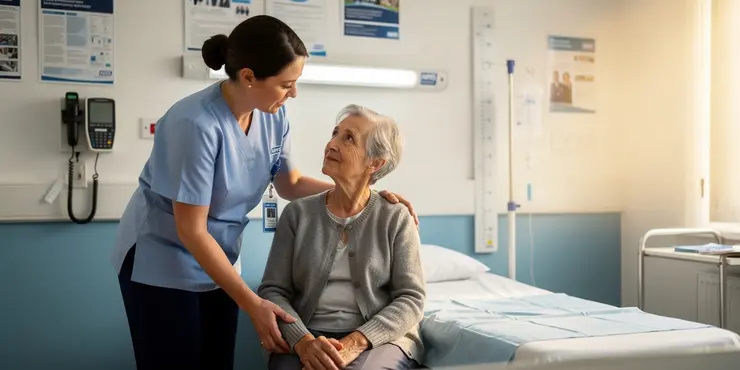
What treatments are available for Alzheimer's disease?
Relevance: 63%
-
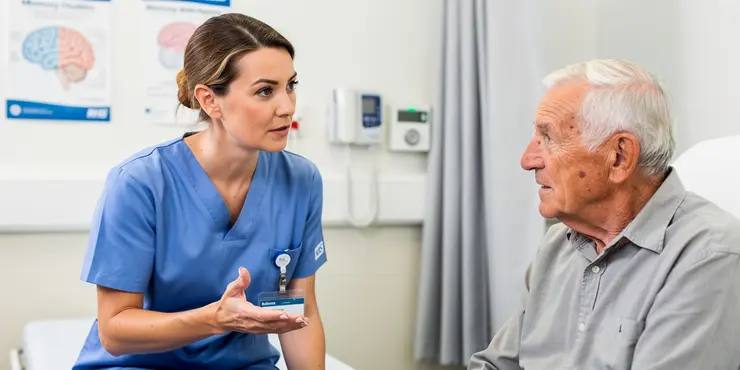
What causes Alzheimer's disease?
Relevance: 63%
-

Can Alzheimer's disease be prevented?
Relevance: 62%
-

What are the symptoms of Alzheimer's disease?
Relevance: 61%
-
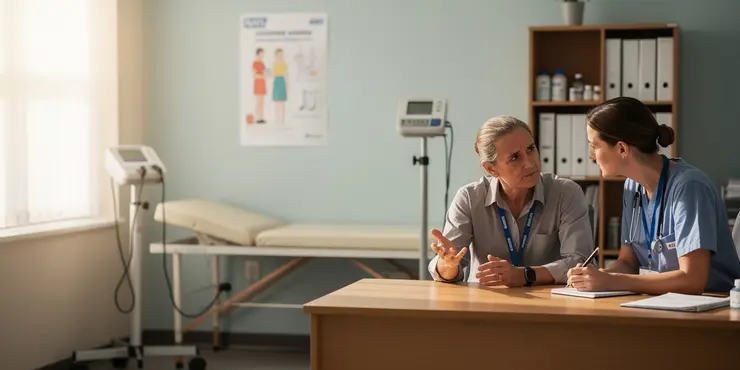
How is Alzheimer's disease diagnosed?
Relevance: 61%
-
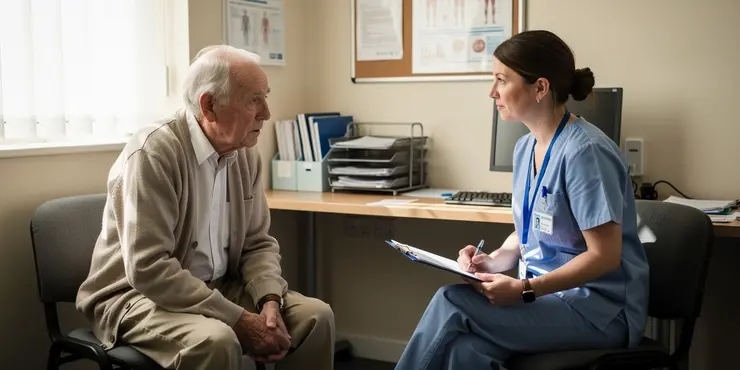
Who is at risk of developing Alzheimer's disease?
Relevance: 61%
-

Where can I find information about Alzheimer's disease for carers?
Relevance: 59%
-

Living with early stage kidney disease
Relevance: 57%
-
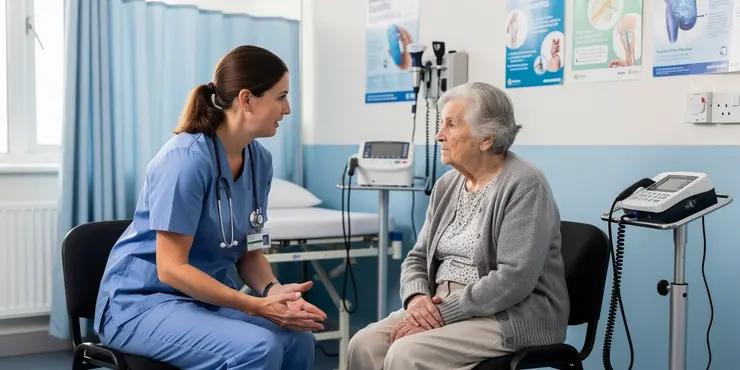
What role does genetics play in Alzheimer's disease?
Relevance: 57%
-

How does Alzheimer's affect daily life?
Relevance: 49%
-

What support is available for carers of Alzheimer's patients?
Relevance: 48%
-

Can technology aid in the care of Alzheimer's patients?
Relevance: 44%
-

What are the stages of testicular cancer?
Relevance: 43%
-

What online communities exist for carers of people with Alzheimer's?
Relevance: 41%
-

Are there any lifestyle changes that can help reduce the risk of Alzheimer's?
Relevance: 40%
-
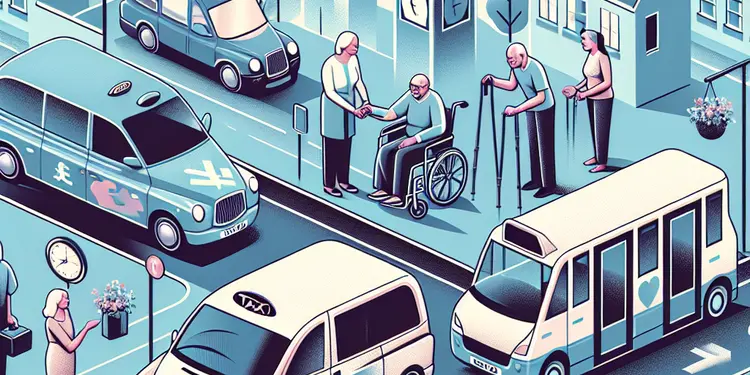
What transportation services are available for Alzheimer's patients and their carers?
Relevance: 40%
-

How can families support a loved one with Alzheimer's?
Relevance: 40%
-

What types of support are available for carers of Alzheimer's patients?
Relevance: 40%
-
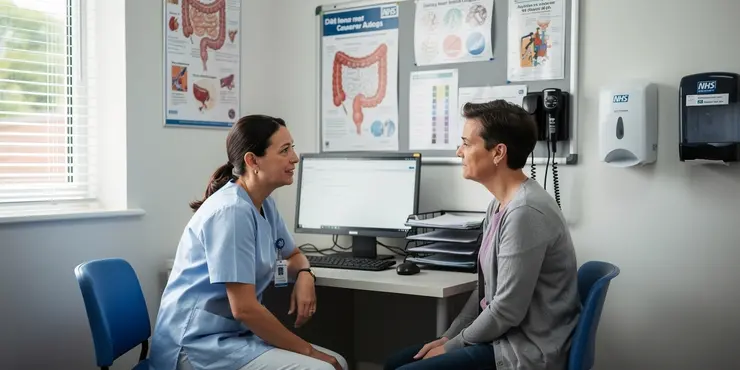
How is the stage of bowel cancer determined?
Relevance: 39%
-

How important is self-care for carers of Alzheimer's patients?
Relevance: 39%
-

Are there specific apps or tools to help carers of Alzheimer's patients?
Relevance: 39%
-

What emotional support is available for carers of Alzheimer's patients?
Relevance: 38%
-

Are there financial support programs for carers of Alzheimer's patients?
Relevance: 38%
-
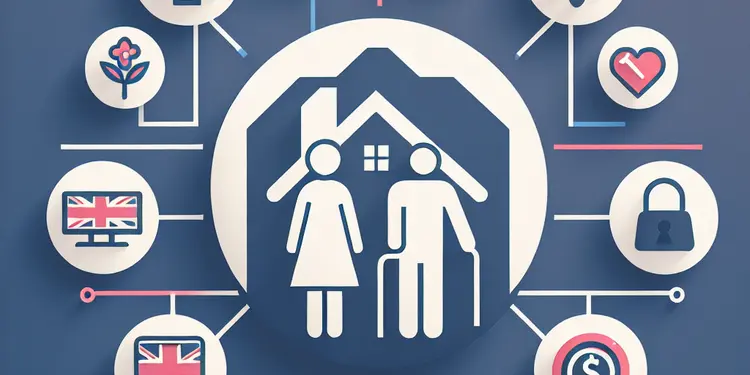
Can carers of Alzheimer's patients access in-home healthcare services?
Relevance: 38%
-

How can support groups benefit carers of Alzheimer's patients?
Relevance: 37%
-

What government assistance is available for carers of Alzheimer's patients?
Relevance: 37%
-

Stage One Paperwork | UK Adoption Journey
Relevance: 36%
-

What legal resources are available for carers of Alzheimer's patients?
Relevance: 35%
-
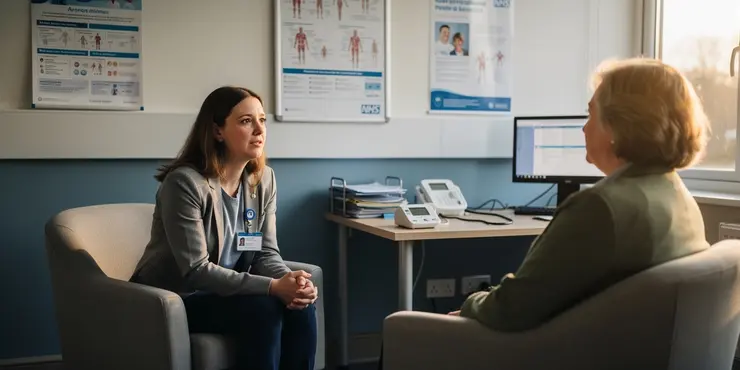
How does dementia progress over time?
Relevance: 33%
-
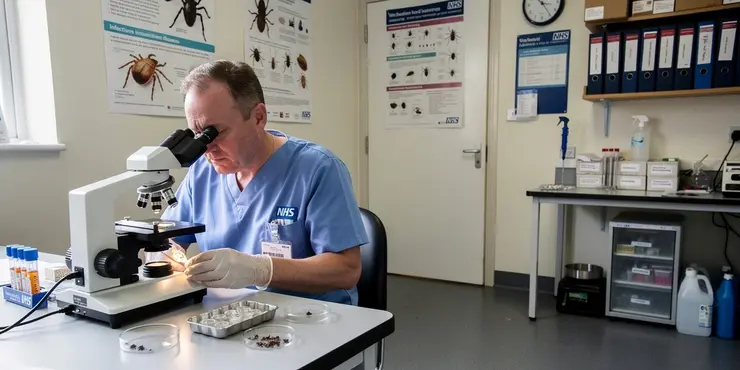
What kind of ticks carry Lyme disease?
Relevance: 32%
-

What is the finger prick blood test for Alzheimers?
Relevance: 31%
-
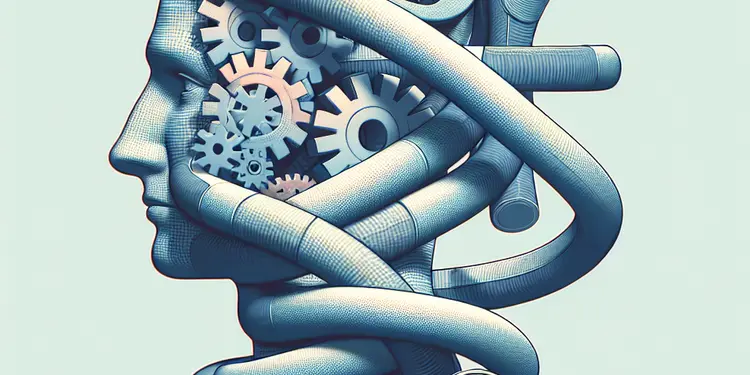
Is Huntington's disease fatal?
Relevance: 31%
-

UK Adoption Journey | What we did to prepare | Stage One Update
Relevance: 30%
-
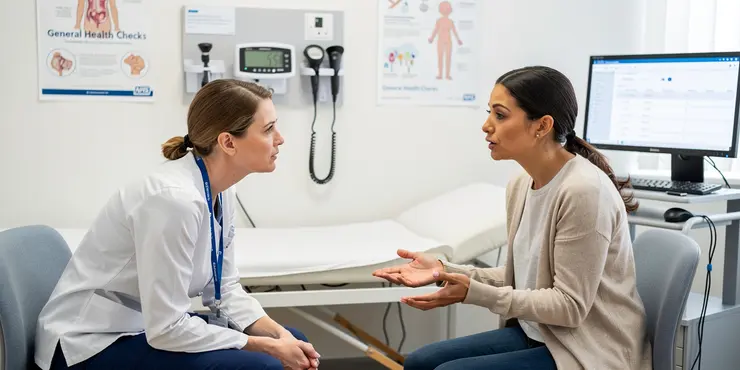
Can Lyme disease be treated?
Relevance: 29%
-
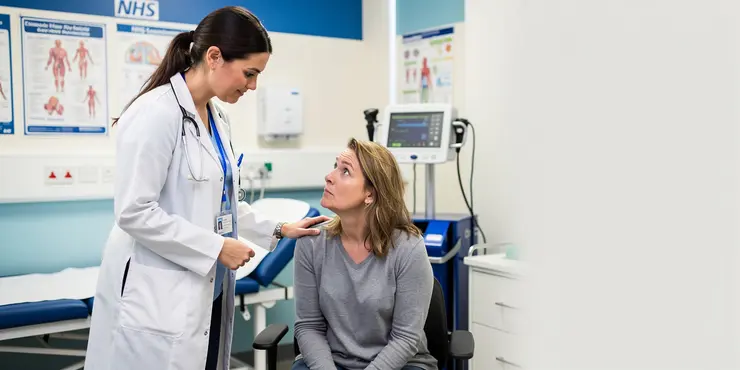
What are common symptoms of Lyme disease?
Relevance: 28%
-
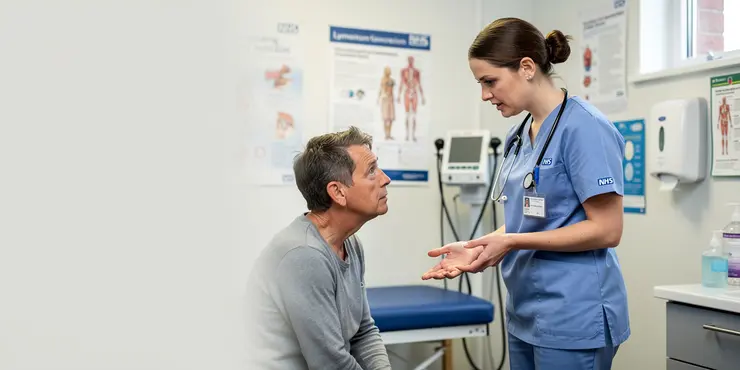
What is Lyme Disease?
Relevance: 28%
What Are the Stages of Alzheimer's Disease?
Alzheimer's disease is a progressive neurodegenerative disorder that affects memory, thinking, behavior, and the ability to perform everyday activities. It is a common form of dementia, especially among older adults. Understanding its stages can help in managing the disease's progression and planning for the care and support needed.
Early Stage (Mild Alzheimer's Disease)
The early stage of Alzheimer's is often when symptoms first appear, although they may be easily overlooked as general signs of aging. This stage may involve subtle changes in memory and cognitive abilities. Individuals may find it difficult to remember recent events or the names of new acquaintances. They might also experience challenges with planning, organizing tasks, and managing finances. Despite these difficulties, people in the early stage of Alzheimer's can often still live independently with minimal support.
Middle Stage (Moderate Alzheimer's Disease)
During the middle stage, symptoms become more pronounced and begin to interfere more significantly with daily life. Individuals may struggle with language, have trouble performing routine tasks, and increasingly require help with personal care. Behavioral changes are also common, such as confusion about time and place, increased frustration or anger, and experiencing mood swings. At this stage, living independently becomes difficult, and more substantial support is needed from caregivers or family members.
Late Stage (Severe Alzheimer's Disease)
In the late stage of Alzheimer's, individuals experience severe memory loss and a decline in cognitive abilities. They often lose the ability to respond to their environment or communicate effectively. Assistance is required for almost all daily activities, and physical abilities also tend to decline, leading to challenges with mobility and swallowing. Comprehensive care is essential at this stage to ensure comfort and quality of life.
Understanding these stages helps in anticipating care needs and planning appropriately to provide support for individuals with Alzheimer's and their families. In the UK, various organisations, such as the Alzheimer's Society, offer resources and support to those affected by this disease.
What Are the Stages of Alzheimer's Disease?
Alzheimer's disease is an illness that slowly gets worse. It affects memory and how we think, behave, and do everyday things. It is a common type of memory illness, especially in older people. Knowing the stages helps us know what to expect and how to help those with the illness.
Early Stage (Mild Alzheimer's Disease)
In the early stage, changes are small, and people might think it's just normal aging. People may have trouble remembering new things or names. They might find it hard to plan, organize, or manage money. Still, many can live on their own with a little help.
Middle Stage (Moderate Alzheimer's Disease)
In the middle stage, changes are more noticeable. People may have trouble with talking, doing everyday tasks, and need more help with personal care. They can feel confused, angry, or have mood changes. At this stage, living alone is hard, and they need more support from family or helpers.
Late Stage (Severe Alzheimer's Disease)
In the late stage, people have a lot of trouble remembering things and thinking clearly. They may not be able to talk or respond well and need help with almost everything. They also may have trouble moving and swallowing. Full-time care is important to help them feel comfortable.
Knowing these stages helps families plan care and support. In the UK, groups like the Alzheimer's Society can offer help and information to those dealing with this illness.
Frequently Asked Questions
What are the stages of Alzheimer's disease?
Alzheimer's disease typically progresses through three main stages: mild (early-stage), moderate (middle-stage), and severe (late-stage).
What are the symptoms of early-stage Alzheimer's disease?
In the early stage, individuals might experience memory lapses, difficulty in recalling words or names, trouble with familiar tasks, and misplacing objects.
How does Alzheimer's disease affect daily life in the moderate stage?
During the moderate stage, symptoms become more pronounced. Individuals may have increased memory loss, confusion about time and place, and need help with daily activities.
What changes occur in the brain during Alzheimer's disease?
Alzheimer's disease leads to the buildup of amyloid plaques and tau tangles in the brain, causing the death of neurons and brain shrinkage.
How long does each stage of Alzheimer's typically last?
The duration varies, but mild stage can last 2-4 years, moderate 2-10 years, and severe 1-3 years.
Can medications help with Alzheimer's symptoms?
Yes, certain medications can help manage symptoms or slow progression in some people, but there is currently no cure.
What are the characteristics of late-stage Alzheimer's?
In severe Alzheimer's, individuals may lose the ability to respond to their environment, carry on a conversation, and eventually control movement.
Is Alzheimer's disease hereditary?
While there is a genetic component, having a family history doesn't guarantee you'll develop Alzheimer's. Various genetic and environmental factors contribute to risk.
How is Alzheimer's disease diagnosed?
Doctors use a combination of medical history, cognitive tests, neurological exams, and brain imaging to diagnose Alzheimer's.
What lifestyle changes can help manage Alzheimer's?
Engaging in regular physical activity, maintaining a healthy diet, staying socially active, and managing stress can support brain health.
Does age affect the development of Alzheimer's disease?
Age is the most significant risk factor. Most people with Alzheimer's are 65 and older, but it can also occur in younger individuals, known as early-onset.
Are there risk factors for Alzheimer's that can be controlled?
Yes, factors like hypertension, diabetes, smoking, and lack of physical activity can be managed to potentially reduce risk.
Can memory improve with treatment in Alzheimer's patients?
While treatments can manage symptoms and provide temporary relief, they do not reverse the disease process.
What is the difference between Alzheimer's and dementia?
Dementia is the general term for symptoms affecting memory, thinking, and social abilities. Alzheimer's is the most common cause of dementia.
How can caregivers support someone with Alzheimer's?
Caregivers can offer structure, set predictable routines, use clear communication, provide engaging activities, and seek support for themselves.
What are the steps of Alzheimer's disease?
Alzheimer's disease is a sickness that makes it hard to remember things and it gets worse over time. Here are the steps:
Step 1: Early Stage
In this step, people might forget small things. They might lose things or forget names. They can still do things by themselves.
Step 2: Middle Stage
In this step, people forget more. They might need help with daily tasks like cooking or dressing. They might get confused about where they are.
Step 3: Late Stage
In this step, people need a lot of help. They might forget the names of family members. They need help with eating and other activities.
Remember, everyone is different. People may need different kinds of help. Using calendars, reminders, or asking someone you trust for help can make things easier.
Alzheimer's disease has three stages. These are called early stage, middle stage, and late stage.
What are the signs of early Alzheimer's disease?
People with early Alzheimer's might:
- Have trouble remembering things.
- Find it hard to plan or solve problems.
- Get confused about time or place.
- Forget words to say or write.
- Lose things often and can't find them.
- Make bad choices.
- Avoid friends or activities they like.
- Feel changes in their mood.
To help:
- Use a calendar to remember dates.
- Make lists of things to do.
- Keep a routine every day.
- Put things back in the same place after use.
- Talk to someone if you feel sad or confused.
At first, people might have trouble remembering things. They might forget words or names. They might find it hard to do things they know well. They might also lose things like their phone or keys.
How does Alzheimer's disease affect daily life in the moderate stage?
Alzheimer's disease is an illness that affects the brain. When someone has Alzheimer's, it changes how their brain works. In the moderate stage, the changes are bigger. This can make daily life harder.
Here are some ways it can affect daily life:
- Remembering things can become more difficult. People might forget names or events.
- Following a plan, like cooking or getting dressed, can be tricky.
- It might be hard to know where they are, even in familiar places.
- They may need help with things they used to do alone, like bathing or using the bathroom.
- Talking with others can be challenging, as they might struggle to find the right words.
Using simple calendars or reminders can help. Family or friends can create a safe, supportive environment. Keeping a regular routine can make things easier too.
In the middle stage, signs get stronger. People might forget more things. They can get mixed up about what time it is or where they are. They might also need help with everyday tasks.
What happens to the brain with Alzheimer's disease?
Alzheimer's disease is a problem that affects how the brain works. It can make it hard to remember things and think clearly. Here is what happens in the brain:
- The brain gets smaller.
- Some brain cells stop working and die.
- It is harder for brain cells to talk to each other.
If you have trouble understanding or remembering these changes, you can try:
- Using pictures to help explain what happens in the brain.
- Talking about it with someone who can help, like a teacher or family member.
- Listening to a story or watching a video about the brain and Alzheimer's.
Alzheimer's disease makes sticky stuff called amyloid plaques and tangles called tau in the brain. These make brain cells die and the brain gets smaller.
How long does each stage of Alzheimer's last?
Alzheimer's is a sickness that changes slowly. It has different stages. Each stage can last a different time for each person.
Here is a simple way to think about the stages:
- Early stage: This is when changes start, but they might be hard to see. This stage can last 2 to 4 years.
- Middle stage: This is when changes are easier to see. People may need more help. This stage can last 2 to 10 years.
- Late stage: This is when changes are big. People need a lot of help. This stage can last 1 to 3 years.
Every person is different, so the time can change for each stage.
Tools to help:
There are tools and techniques that can help people with Alzheimer's. Talking to doctors, using reminder notes, and asking family for help can be useful.
The time it takes can be different for each person.
The mild stage can last 2 to 4 years.
The moderate stage can last 2 to 10 years.
The severe stage can last 1 to 3 years.
Can medicine help with Alzheimer's signs?
Yes, some medicines can help people with Alzheimer's. They might help with memory and thinking. But the medicine does not stop Alzheimer's.
It is good to talk to a doctor about the best medicine. The doctor can help choose what is right.
Other things that can help are:
- Doing puzzles or games to keep the brain busy.
- Eating healthy food and staying active.
- Talking to friends and family.
If you need help reading, you can try:
- Listening to audiobooks.
- Using apps that read out loud.
Yes, some medicines can help with symptoms or slow things down for some people, but there is no way to make it go away completely.
What happens in the late stage of Alzheimer's?
In the late stage of Alzheimer's, people need a lot of help. They may find it hard to talk and might not remember family or friends. They need help with eating, dressing, and going to the bathroom.
They might sleep a lot and have trouble sitting up or walking.
Using pictures and simple words can help them understand. You can also play calm music or show them things they like.
When someone has bad Alzheimer's, they might not be able to talk or react to the things around them. They may also have trouble moving.
Can you get Alzheimer's disease from your parents?
Alzheimer's disease is a sickness that can cause problems with memory and thinking. Sometimes, it can run in families, which means if your parents or grandparents had it, you might get it too.
But not everyone who has a family member with Alzheimer's will get it. Eating healthy, exercising, and keeping your mind busy can help keep your brain strong.
Talking to a doctor can also help you learn more about Alzheimer's and what you can do. They can give you information and support.
Having family members with Alzheimer's doesn't mean you will get it too. Many things, like genes and the environment, can affect the risk.
How do doctors find out if someone has Alzheimer's disease?
Doctors use different ways to check if a person has Alzheimer's. Here is how they do it:
- Ask Questions: Doctors ask about memory problems and changes in thinking.
- Memory Tests: Simple tests to check how well a person remembers things.
- Talking to Family: Doctors speak with family members to learn about changes.
- Check the Body: Doctors look for other health problems that might cause memory loss.
- Pictures of the Brain: Sometimes, doctors use machines to take pictures of the brain.
These steps help doctors understand if someone has Alzheimer's. Families and friends can also help by noticing changes and sharing this with the doctor.
Tools and Tips:
- Use a calendar to remember important dates.
- Write notes about daily tasks.
- Ask family or friends for help.
Doctors find out if someone has Alzheimer’s by looking at their medical history, testing how they think, checking their nerves, and taking pictures of their brain.
How can I change my life to help with Alzheimer's?
Doing things like playing or moving a lot, eating good food, talking to and playing with friends, and staying calm can help your brain stay healthy.
Can getting older make Alzheimer's disease worse?
Getting older is the biggest risk for Alzheimer's. Most people with this sickness are 65 years or older. But younger people can get it too. This is called early-onset Alzheimer's.
If you find reading hard, you can try these tips:
- Use simple words.
- Read short sections at a time.
- Ask someone to read with you and explain.
- Highlight important words.
Can we do things to lower the risk of Alzheimer's?
Yes, some things can help. Here are a few tips:
- Stay active: Try to exercise regularly, like walking or playing outside.
- Eat well: Eat lots of fruits and vegetables.
- Mind games: Play games that make you think, like puzzles or reading books.
- Stay social: Spend time with friends and family.
These can help keep your brain healthy. Ask a grown-up for more ideas.
Yes, you can do things to help stay healthy. These include:
- Keeping your blood pressure normal.
- Managing your diabetes.
- Not smoking.
- Exercising regularly.
These things can help lower your risk of getting sick.
Can people with Alzheimer's get better at remembering things with treatment?
Alzheimer's is a disease that makes it hard to remember. Some treatments might help with memory. Doctors can try different ways to help. Simple activities, like playing memory games, might help too. It's important to talk to a doctor to find the best help.
Using pictures or writing things down can make it easier to remember. There are also apps and tools that can help remind you of important things.
Treatments can help with symptoms and make you feel better for a while, but they do not make the disease go away.
How are Alzheimer's and dementia different?
Dementia is a word for problems with thinking and memory. It makes it hard to remember, learn, and talk.
Alzheimer's is a kind of dementia. It is the most common type. People with Alzheimer's have trouble with their memory and thinking.
Tools to help:
- Use memory aids like lists and reminders.
- Ask someone to explain things if you find them hard to understand.
- Talk to a doctor about any questions or worries.
Dementia is when the brain has trouble with things like remembering, thinking, and talking to other people. Alzheimer's is a type of dementia and it happens the most.
How can caregivers help someone with Alzheimer's?
Caregivers can do many things to help people with Alzheimer’s feel better. Here are some ideas:
- Be Patient: People with Alzheimer's can forget things. Take your time with them.
- Speak Clearly: Use simple words and short sentences.
- Make a Routine: Do things at the same time each day. This helps them know what to expect.
- Use Pictures: Show pictures or use objects to explain things.
- Stay Safe: Make the home safe by removing things that could cause falls.
- Be Kind: Show love and care with your words and actions.
Using tools like picture books or charts can also help. Always listen and be supportive.
People who take care of others can help by:
- Making a plan and sticking to it.
- Keeping daily routines the same.
- Talking clearly so everyone understands.
- Finding fun things to do together.
- Asking for help when they need it.
Useful Links
This website offers general information and is not a substitute for professional advice.
Always seek guidance from qualified professionals.
If you have any medical concerns or need urgent help, contact a healthcare professional or emergency services immediately.
Some of this content was generated with AI assistance. We’ve done our best to keep it accurate, helpful, and human-friendly.
- Ergsy carfully checks the information in the videos we provide here.
- Videos shown by Youtube after a video has completed, have NOT been reviewed by ERGSY.
- To view, click the arrow in centre of video.
- Most of the videos you find here will have subtitles and/or closed captions available.
- You may need to turn these on, and choose your preferred language.
- Go to the video you'd like to watch.
- If closed captions (CC) are available, settings will be visible on the bottom right of the video player.
- To turn on Captions, click settings .
- To turn off Captions, click settings again.
More Items From Ergsy search
-

What are the stages of Alzheimer's disease?
Relevance: 100%
-

How can carers plan for future stages of Alzheimer's disease?
Relevance: 82%
-

What is Alzheimer's disease?
Relevance: 72%
-

How common is Alzheimer's disease in the UK?
Relevance: 66%
-

What treatments are available for Alzheimer's disease?
Relevance: 63%
-

What causes Alzheimer's disease?
Relevance: 63%
-

Can Alzheimer's disease be prevented?
Relevance: 62%
-

What are the symptoms of Alzheimer's disease?
Relevance: 61%
-

How is Alzheimer's disease diagnosed?
Relevance: 61%
-

Who is at risk of developing Alzheimer's disease?
Relevance: 61%
-

Where can I find information about Alzheimer's disease for carers?
Relevance: 59%
-

Living with early stage kidney disease
Relevance: 57%
-

What role does genetics play in Alzheimer's disease?
Relevance: 57%
-

How does Alzheimer's affect daily life?
Relevance: 49%
-

What support is available for carers of Alzheimer's patients?
Relevance: 48%
-

Can technology aid in the care of Alzheimer's patients?
Relevance: 44%
-

What are the stages of testicular cancer?
Relevance: 43%
-

What online communities exist for carers of people with Alzheimer's?
Relevance: 41%
-

Are there any lifestyle changes that can help reduce the risk of Alzheimer's?
Relevance: 40%
-

What transportation services are available for Alzheimer's patients and their carers?
Relevance: 40%
-

How can families support a loved one with Alzheimer's?
Relevance: 40%
-

What types of support are available for carers of Alzheimer's patients?
Relevance: 40%
-

How is the stage of bowel cancer determined?
Relevance: 39%
-

How important is self-care for carers of Alzheimer's patients?
Relevance: 39%
-

Are there specific apps or tools to help carers of Alzheimer's patients?
Relevance: 39%
-

What emotional support is available for carers of Alzheimer's patients?
Relevance: 38%
-

Are there financial support programs for carers of Alzheimer's patients?
Relevance: 38%
-

Can carers of Alzheimer's patients access in-home healthcare services?
Relevance: 38%
-

How can support groups benefit carers of Alzheimer's patients?
Relevance: 37%
-

What government assistance is available for carers of Alzheimer's patients?
Relevance: 37%
-

Stage One Paperwork | UK Adoption Journey
Relevance: 36%
-

What legal resources are available for carers of Alzheimer's patients?
Relevance: 35%
-

How does dementia progress over time?
Relevance: 33%
-

What kind of ticks carry Lyme disease?
Relevance: 32%
-

What is the finger prick blood test for Alzheimers?
Relevance: 31%
-

Is Huntington's disease fatal?
Relevance: 31%
-

UK Adoption Journey | What we did to prepare | Stage One Update
Relevance: 30%
-

Can Lyme disease be treated?
Relevance: 29%
-

What are common symptoms of Lyme disease?
Relevance: 28%
-

What is Lyme Disease?
Relevance: 28%


